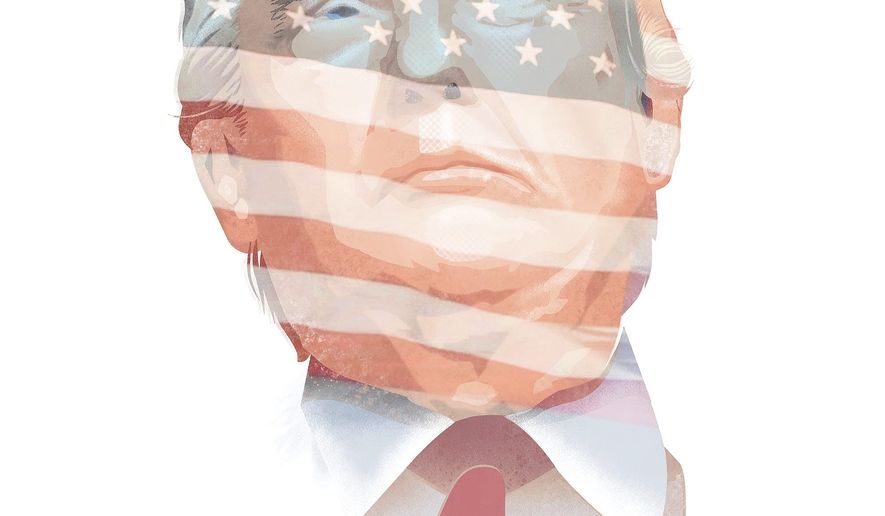OPINION:
There’s a move to define Donald Trump as a populist, so as to link him to some of the nastier people in American politics, like Pitchfork Ben Tillman, Father Coughlin and David Duke.
But he’s better seen as a nationalist, and an authentic American nationalism can never be tinged with racism, as populism is, or exclude members of minority cultures.
So what is American nationalism? In other countries, nationalism is a matter of a common culture. Now, there is such a thing as an American culture, but it’s not a white culture or a black culture or a Mexican culture. It’s a mixture of all of them. And far more important than a common culture is a liberal nationalism based on the sacred texts of our Founding Fathers.
If nationalism is a matter of dynastic houses and cultural icons in other countries, America does entirely without the former and increasingly without the latter. Instead, the focal point for national sentiments is the sense that America has a special mission to promote liberty, as promised by the Declaration of Independence and guaranteed by the Bill of Rights.
Because constitutional liberties are the core icon of American nationhood and constitutive of our identities as Americans, they limit what we can do or say. For Americans, as Americans, illiberalism is self-defeating, and when Americans have been illiberal in the past, in time they’ve been seen to be un-American.
Pay attention to Mr. Trump’s speeches, and you’ll see that he’s tried to adhere to a sense of liberal nationalism. In his Inauguration Address he said, “It is time to remember that old wisdom our soldiers will never forget: that whether we are black or brown or white, we all bleed the same red blood of patriots, we all enjoy the same glorious freedoms, and we all salute the same great American Flag.” If he’s strayed from these principles, in some of those 3 a.m. tweets, he’s also been constrained by them, simply because he’s an American.
And what are those constitutional norms? Liberty and equality, of course, but in addition, nationalism has also something to say about fraternity. That might seem a little odd. The French talk about “Liberty, Equality and Fraternity.” Not the Americans.
And yet, like the French, American nationalists must distinguish between strangers and brothers, non-citizens and citizens. They must feel a special sense of fraternity with their fellow citizens. That’s the logic of nationalism. Otherwise it’s a hollow fraud.
The nationalist will prefer fellow citizens over non-citizens. He’ll deny to non-citizens rights and privileges he’d grant to fellow citizens. But what he denies the non-citizen must then be paid for by what he would give to his fellow citizens. If the nationalist wants to reduce immigration from non-citizens, for example, he must argue that this will benefit fellow citizens. By contrast, the anti-nationalist can treat both citizens and non-citizens alike. If he is a progressive, he might want to offer the same, generous welfare rights to both groups of people. And if the anti-nationalist is a libertarian, he might prefer to deny welfare rights to both groups. Nationalism, on the other hand, is about differences, about preferences for fellow citizens. Along with his love of liberty and equality, the American nationalist must prize fraternity.
Unlike the libertarian, then, the nationalist will think that his government must have a concern for the welfare of his fellow citizens. That’s why the Left’s contempt for American history and institutions is self-defeating, when it clamors for a stronger social safety net. The left demands universal health care as a right, but this assumes a correlative duty, and such duties are not owed to foreigners. I have no duty to support an Albanian health care system, for example. The better argument for universal health care is that it’s something a nationalist owes to his fellow citizens. Sadly, however, the left refuses to rely on nationalist sentiments. It finds nothing to praise in American history, rejects a common American culture, despises its conservative opponents, and then reviles them when they object to the ill-planned Obamacare legislation. They should have seen that one coming.
Fraternity is the key to the new party Mr. Trump created and called the Republican Workers Party. It is nationalist, and nationalism has a gravitational pull when it comes to economics: it draws voters to the middle of the road or to liberal economic policies. It can’t be indifferent to how fellow citizens fare.
At the same time, the movement Mr. Trump created is deeply conservative, protective of our social and religious institutions, proud of our country and opposed to socialist planning of the economy. At times it might seem a little nave, over trade policy for example, but it’s still the only vehicle for conservative electoral success.
Conservative and nationalist, is that so odd a combination? Not if one knows anything about conservatism in our sister parliamentary governments. Tory parties in Britain and Canada, from Benjamin Disraeli to Sir John A, Macdonald, have defined themselves in just that way, and in the process have “dished the Whigs.” Just like Mr. Trump did in 2016.
• F.H. Buckley teaches at Scalia Law School and is the author of “The Republic of Virtue: How We Tried to Ban Corruption, Failed, and What We Can Do About It.”




Please read our comment policy before commenting.